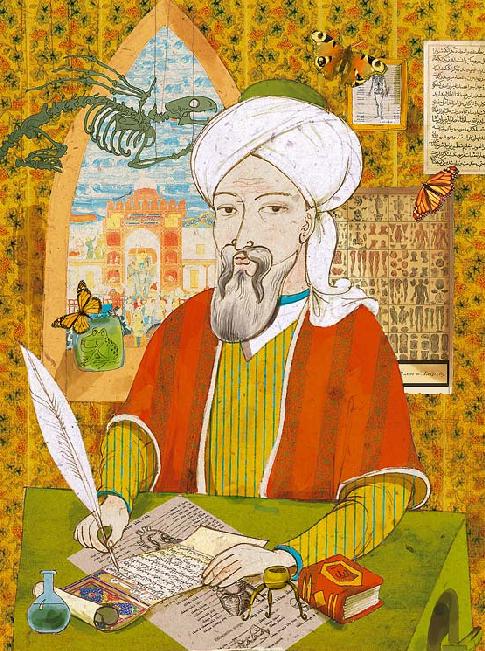
There exists a contradiction between two broad, influential phenomena in societies and cultures: these are the phenomena of takfīr (‘excommunication’)[1] and tafkīr (‘cogitation’), in that the one who thinks does not excommunicate others and the one who excommunicates generally does not think. Thinking offers life while takfīr offers death, since the thinker by his very educated nature is in no need of excommunicating others since he employs his mind, his thought and his culture.
THE TAKFIRIST on the other hand lacks mental capacity, a cogent argument or any convincing evidence for his views, and therefore – as a self-contained, impotent person who fears thought and its influence – he resorts to expulsion and takfīr and to accusations of atheism and freethinking, or ‘going beyond the bounds of the faith’. He then proscribes the man’s wealth, his honour, or his life and licenses the burning of his books. Over the course of history this has acted like some drawn sword against scholars, intellectuals, writers and reformers, fighting against thinking, culture and learning whenever it presents criticism and rivalry to those in power and influence, or to rulers and their loyal preachers –for takfīr is not free of political, social and economic factors.
Whenever thinking, the mind and openness to ideas becomes prohibited, there is an increase in takfīr, fanaticism, ignorance, self-isolation and extremism. Thinkers and intellectuals challenge self-containment in culture and thought with broader horizons in the world of knowledge, modern science and human civilisation and human experience, in order to assuage the crises of our societies. All this is in addition to the intrinsic value of dialogue and symbiosis and openness to others in an exchange of ideas, a cross-fertilisation of minds and cultural integration. The opposite is the case with the second category, the takfīris, who narrow their vision against thought or scholarship or criticism, so that they may live self-contained and limited by their narrowed horizons.
Whenever thinking becomes prohibited there is an increase in takfīr
All of this is despite the fact that the Qur’ān contains dozens of verses calling for thought, for the intellect, for reflection and study: Have ye no sense?[2], Will they then not meditate? [Qur’ān IV,82; XLVII,23]; even freedom for the other: There is no compulsion in religion [II,256 ]; Then whosoever will, let him believe, and whosoever will, let him disbelieve [XVIII,29 ]; Unto you your religion, and unto me my religion [CIX,6]; Ye have charge of your own souls. He who erreth cannot injure you if ye are rightly guided [V,105] and similarly for dialogue with the other: Lo! we or you assuredly are rightly guided or in error manifest [XXXIV,24]; Say: O People of the Scripture! Come to an agreement between us and you [III,64]; even that God Almighty spoke with Satan several times in the Qur’ān, and that Satan requested Him to: Reprieve me till the day when they are raised (from the dead) [VII,14; XV,36]; to which God replied: Lo! thou art of those reprieved [VIII,15; XV,37]; and Moses spoke with Pharaoh and Abraham with Nimrod, and the Qur’ān rejected intellectual petrification: Lo! the worst of beasts in Allah’s sight are the deaf, the dumb, who have no sense [VIII,22]; Say: Are the blind man and the seer equal? Will ye not then take thought? [VI,50]; and the Qur’ān rejected the blind imitation of forefathers: They say: We follow that wherein we found our fathers. What! Even though their fathers were wholly unintelligent and had no guidance? [II,170]. Indeed it actually called for close examination even of the divine Text: Will they not then ponder on the Qur’ān? [IV,82]; and it welcomed the exponents of the mind and of thought: Therefore give good tidings (O Muhammad) to My bondmen Who hear advice and follow the best thereof. Such are those whom Allah guideth, and such are men of understanding [XXXIX,17-18].
Takfīr and the Khawārij
But over the course of Islamic history a number of fanatical parties have arisen calling for the takfīr of others irrespective of their profession of Islam, and issuing fatwas calling for their death on the grounds of ‘disbelief’ and ‘departure for the fold of the community and the faith’. Scholars point to the phenomenon first manifesting itself during the time of the Khawārij[3] who populated the ranks of Imām ‘Alī ibn Abī Tālib at the battle of Siffīn. The phenomenon arose following the raising aloft of the Qur’ān texts at the instigation of ‘Amr ibn al-‘As when he called for the adjudication of the Qur’ān and was supported in this by the Khawārij on the grounds of the text: To God alone is the dominion. They were assiduous in their cleaving to the Qur’ān, and were conspicuous by their dark patches on their foreheads due to the intensity of their praying, fasting and acts of worship. The best description of them was given by Ibn ʽAbbās:
I have seen dark marks from calluses from their many acts of worship and hands like the calluses of camels, they wear the ragged clothes of ascetics as they assiduously prostrate themselves in prayer, and humble themselves and weep and give themselves over entirely.
These Khawārij subsequently turned highway robbers and set up an encampment outside the city to prevent Muslims from passing unless they pronounced ‘Alī and Muʽāwiya ‘disbelievers’ – on pain of death if they refused to do so. They killed many like this, including a Companion of the Prophet, and went on to dismember his pregnant wife since they had refused to pronounce takfīr upon ‘Alī. This was at a time when the community vehemently and violently deplored the acts of Khawārij who trespassed into an orchard and laid hands on a cluster of fruit, since it constituted a transgression against the property of a Muslim – a blatant contradiction between licensing the taking of someone’s life and at the same time forbidding the consumption of his goods.
The faqīh opposes science and criticism since he aims to monopolize the understanding of the Text
Imam ‘Alī attempted to enter into dialogue with them when he posed the question: “who taught you to kill people for their opinions?” He thus taught us to respect freedom of opinion, that it was not permissible to kill anyone on the basis of his opinions. Their reply was: “May God fight you for what He taught you, for we do not believe what you say nor do we pray behind you.” To which he in turn responded: “You have all this and more besides” (that is, they had the right to oppose him, and repudiate the prayer behind him, since these are natural rights). He then began to enumerate additional rights that were previously unknown to them. However, he went on to place a defining limit on their rights with the words: “Standing between yourselves and me is the killing and oppression of men” – that is, they had all their rights provided that they did not transgress upon others, by oppressing them or killing them. ‘Alī then named them ‘the worst of all men’ for their exploiting of religion in a most disgraceful manner, through their slaying of all those holding opinions that differed from theirs.
He issued a recommendation that they should not be combated after his passing (“do not fight the Khawārij after me, since although they sinned, they were nevertheless seekers after the truth”). Despite this one of the Khawārij, ‘Abd al-Rahmān ibn Muljam[4], attacked ‘Alī and, while striking him down in the Mosque of Kufa on the Laylat al-Qadr in the month of Ramadan, uttered the words: “Governance belongs to God, not to you, ‘Alī!” This fanaticism was due to their belief in their being close to God, as indicated by the verse on the incident:
A blow from a pious one whose intent was none other than to attain favour of the Most High.[5]
An ancient affliction
But the truth of the matter is that takfīr made its appearance before the time of the Khawārij, in the treatment meted out to the third of the Orthodox Caliphs ‘Uthmān ibn ‘Affān when he was besieged, denounced as an infidel and killed bestially while reading the Qur’ān, when his wife’s fingers were severed and he was left groaning in pain throughout the night, and his burial in a Muslim cemetery prevented.[6]
Many scholars were excommunicated by takfīr, such as Ibn Sīnā (Avicenna), whose response to them was: “excommunicating me should not be an easy or haphazard matter”. In fact takfīr has been pronounced on those who claimed the world was round, or demonstrated its movement, or on those who rode automobiles or aeroplanes at the time they were invented, on the grounds that these were creations of the Devil or of Infidel lands. Such things were, and are, due to the distance of the faqīh from reality, from life and from modern sciences, in that he immerses himself in ancient books, in an ancient nation and a language that is replete with obscurities and problems, despite his superficial treatment of social, intellectual, philosophical and scientific questions.
What is noteworthy is the oddness of some of the fatwas promulgated on contemporary issues such as cloning and cross-fertilisation and ‘the replacement of a man’s head with that of an animal’ as it is called in contemporary fiqh. The intellectual, on the other hand, is in step with modern reality and the challenges posed by its concerns and aspirations. He is in step with the modern age, and takes a more realistic and objective position vis-à-vis the era and its sciences and challenges, albeit some of the intellectuals may have a superficial knowledge of heritage and history and may be unaware of their traces.
There is a pressing need for objective, precise criticism… and for a critical evaluation of the cross-fertilisation of ideas
Historically, and up to the present day, there are many examples of takfīr issued against Islamic legal and scholastic denominations, such as the Mu’tazila, or the Ikhwān al-Safā[7] or the killings associated with the tale of the ‘created Qur’ān’[8]. Likewise there was the takfīr of Al-Jāhiz and Abū Hayyān al-Tawhīdī, and Nasr Hāmid Abū Zayd and Tāhā Husayn, of Amīn al-Khouli, Muhammad Ahmad Khalaf Allāh and of Fazlur Rahman and Muhammed Arkoun, Hasan Hanafī, Muhammad ‘Ābid al-Jabrī, Mahmūd Tāhā, ʽAlī al-Wardī, Ali Shariati, of al-Maʽarrī, al-Mutanabbī, al-Rusāfī and al-Jawāhirī and Nazzār Qabbānī, and Nāzik al-Mala’ika, Badr Shākir al-Siyāb, of Ibn ‘Arabī and a whole long list of others.
Nasr Hāmid Abū Zayd in his book Al-Tafkīr fī Zaman al-Takfīr (‘Thinking in the Time of Excommunication’) worked valiantly against ignorance, falsehood and superstition when he dubbed our age as one critical for the takfīr of thinkers. He evidenced this in his personal ordeal, in the uncontested and undisputed fatwas he endured calling for his takfīr, for the dissolution in Egypt of his marriage to his wife Ibtihal Yunis, who subsequently followed him to the Netherlands where he taught at the University of Leiden. It should be noted, however, that his true difficulties occurred following his re-reading of the Text and his attempt to free it from repeated, classical, traditional readings, towards a broader horizon harmonizing with the modern age and its sciences. In these he made use of epistemological tools and modern scientific methodologies, as we see in his books and studies such as Imām al-Shāfiʽī and the Foundation of the Wasatiyya; The Problematic of Reading and the Method of Interpretation; Metaphor in the Qur’ān according to the Muʽtazila and Thus Spake Ibn ʽArabī.
As Abu Zayd observes in the introduction to his book on takfīr:
It is a point of shame that someone who attempts to exercise thought should be described as an ‘infidel’ and that takfīr should be the reward for thinking, and that the university – a place of learning, knowledge and reflection – should be turned into a mosque replete with preachers of the hell of political Islam … my discourse threatens the discourse of the Islamists since it analyses it and reveals its errors and the way they sport with political discourse. They know full well that I am not an apostate and that there isn’t a single evidence of that in any of my books.
Here is where the struggle between the intellectual and the faqīh is made patent. For the intellectual’s role is one of expertise and science, as Seymour Martin and Raymond Aaron put it, as well as one of a critic and evaluator, as Karl Mannheim[9] put it. The faqīh opposes this since he aims to monopolize the understanding of the Text and its interpretation, and in his march towards power and authority refuses to accept criticism even from other faqīhs. This has been the case with the faqīhs and imams of the various schools of law over the course of history.

Suggested Reading
Takfīrist fatwas in general harbour political motives generated by fear of thought and learning and awareness, but they are framed in religion and sanctity since they cannot openly reveal to people their true political motivations. The emotional character of people in our societies is roused by, and interacts with, religious impulses far more and far longer than with purely political impulses, as ‘Alī al-Wardī and Ali Shariati observe. The important truth to grasp is that whenever thinking and the intellect and critical spirit are blocked, takfīr, fanaticism and ignorance take over. In the movement promoting thought and culture there is therefore a pressing need for objective, precise criticism, and for a critical evaluation of the cross-fertilisation of ideas, whether this be from Al-Maʽarrī’s Luzūmiyyāt[10] or the wisdom of the Muʽtazila, from the thought of Abu Zayd or the Tawāsīn of al-Hallāj[11], from the Futūhāt of Ibn ʽArabī[12] or the Adab of Tāhā Husayn[13], from Al-Wardī’s sermons and the humanism of Arkoun or the Rudūd of al-Jāhiz, the Rasā’il of the Ikhwān al-Safā or the Ishārāt of Abū Hayyān[14]. The same goes for the language of Al-Khouli, the philosophy of Ibn Rushd, al-Jabri’s critical method, and Fazlur Rahman’s modernism. This is for the sake of the promotion of the mind and thought to accommodate new horizons of innovation, progress and advancement. The West could not have progressed as it did were it not for modernism and the proper delimitation of the role of the Church, something which is in stark contrast to our states with all their intellectual and cultural regressions.
For takfīrist fatwas are even now being issued against intellectuals and thinkers and writers, and against women as a result of this domination of Islamist religious parties and their centres of authority. The closing of the Union of Scholars, of the centres of culture and thought and enlightenment that is now taking place in Iraq, their depiction as ‘centres of corruption’, and the killing of scholars, journalists and activists, this brain-drain and culture-drain – is something that brings to mind the rule of Iran’s Vilayet al-Faqih or of the Taliban. These fatwas defend and license the theft of public property, the confiscation of the legal rights of millions, the forging of certificates and even the theft of ration cards for the benefit of their leaderships and hangers-on and official preachers, in a bid to turn Baghdad into Kandahar or Qum, with all their ignorance, backwardness and fanaticism, and their suppression of liberties, culture, thought, literature and the Rights of Man.
[1] See Glossary.
[2] Cf. Qur’ān: II,44,76; III,65 ; VI,32 ; VII,169 ; X,16 ; XI,51 ; XII,108 ; XXI,10,67 ; XXIII,80 ; XXVIII,60 ; XXXVII,138.
[3] See Glossary: Kharijite.
[4]‘Abd al-Rahmān ibn Muljam al-Sarīmī, one of three assassins tasked with avenging the Khārijī defeat at the Battle of Nahrawān (659 AD) by murdering three Muslim leaders: Muʽāwiya ibn Abī Sufyān, ‘Amr ibn al-ʽĀs and ‘Alī ibn Abī Tālib. Ibn Muljam was the only one to succeed in his allotted task. (Ed.)
[5] The verse is from the Khārijī poet ‘Imrān ibn Hattān al-Sadūsī. He goes on to say: I call him to mind some days, and consider him the closest of humankind to God in equity / I esteem any folk whose graves are birds’ bellies – those whose faith is untainted by injustice or enmity. (Ed.)
[6] Muslim historiography records ‘Uthmān’s wife Nayla suffering her fingers severed as she attempted to shield him from the blows of the assassins. He is said to have been forbidden burial in the Jannat al-Bāqī graveyard in Medina, so that he was interred in the Jewish cemetery behind it. (Ed.)
[7] The ‘Brethren of Purity’ or ‘Sincerity’ who formed in 10th century Basra a secret society of Muslim philosophers. Their identities have never been established, but it is thought that they were proto-Isma’ilis. One of their most famous texts of their Rasā’il (‘Letters’) describes the perfect man, who would be: “of East Persian derivation, of Arabic faith, of Iraqi, that is Babylonian, in education, Hebrew in astuteness, a disciple of Christ in conduct, as pious as a Syrian monk, a Greek in natural sciences, an Indian in the interpretation of mysteries and, above all a Sufi or a mystic in his whole spiritual outlook.” (Ed.)
[8] See Glossary under Mu’tazila.
[9] Karl Mannheim (1893-1947), a Hungarian-born sociologist who was one of the founding fathers of classical sociology and a founder of the sociology of knowledge. (Ed.)
[10] The Syrian philosopher poet Al-Maʿarrī (973-1057) was a skeptic in his beliefs and denounced superstition and dogmatism in religion. His creed was that of a philosopher and ascetic, for whom reason provides a moral guide, and virtue is its own reward. His poetical work the Luzūm mā lā yalzam (‘Supererogatory Matters’ or ‘Unnecessary Exigencies’) abounds with sceptical views, but were sufficiently couched in pious terms to shield him from the charge of heresy. Another of his works, the Risālat al-Ghufrān (‘Letter of Pardon’) in which the poet visits paradise and meets the Arab poets of the pagan period, has been compared to Dante’s Divine Comedy. (Ed.)
[11] Mansūr al-Hallāj (c.858-922) was a Persian mystic who believed one had to go beyond the forms of religious rites to reach divine reality. His energetic attempts to share Sufi teachings with the masses led him into conflict with the authorities, who had him executed for heresy. For his desire of oneness with God, many Muslims criticized him as a ‘crypto-Christian’ for distorting the monotheistic revelation in a Christian way. His most famous work is the Kitab al-Tawasīn in which occurs the famous phrase expressing his abandonment in God: anā al-haqq (‘I am the Truth’). (Ed.)
[12] Ibn ‘Arabī (1165-1240) was an Arab Sufi mystic and philosopher from Muslim Spain. His major work al-Futūhāt al-Makkiya (‘The Meccan Conquests’) is an encyclopaedic compendium of esoteric knowledge. (Ed.)
[13] Taha Husayn (1889-1973) was an Egyptian thinker and writer, and at one time Minister for Education. He was a strong proponent of enlightenment, respect for reason, and women’s emancipation and became famous for his ground-breaking reinvestigations of the Arab cultural heritage, including Fī al-Shi’r al-Jāhilī (‘On Pre-Islamic Poetry’). This sceptical analysis of the authenticity of pre-Islamic poetry also included indirect hints that the Quran was not to be taken as an objective source of history. He stressed that Egypt would only progress by reclaiming its ancient, pre-Islamic roots and his oeuvre aroused the intense anger and hostility of al-Azhar and many other traditionalists. (Ed.)
[14] Abū Hayyān al-Tawhīdī (c.930-1023) was an Arabic litterateur and philosopher and the al-Ishārāt al-Ilāhiyya is one of his several works outlining his doctrine, which is one heavily influenced by Neoplatonism and by Gnostic elements. (Ed.)


